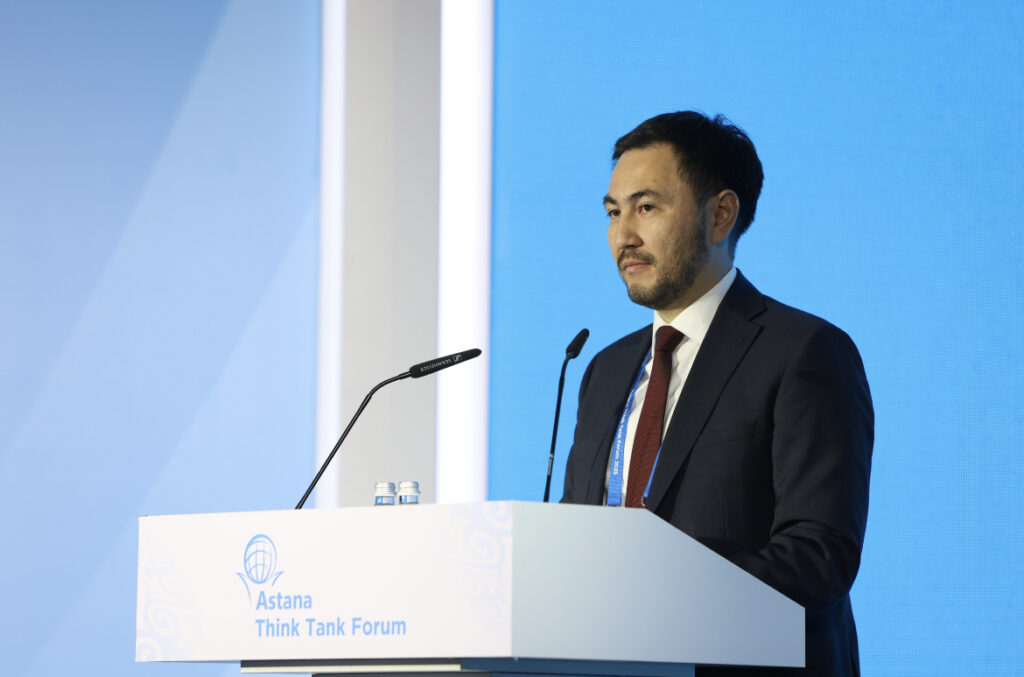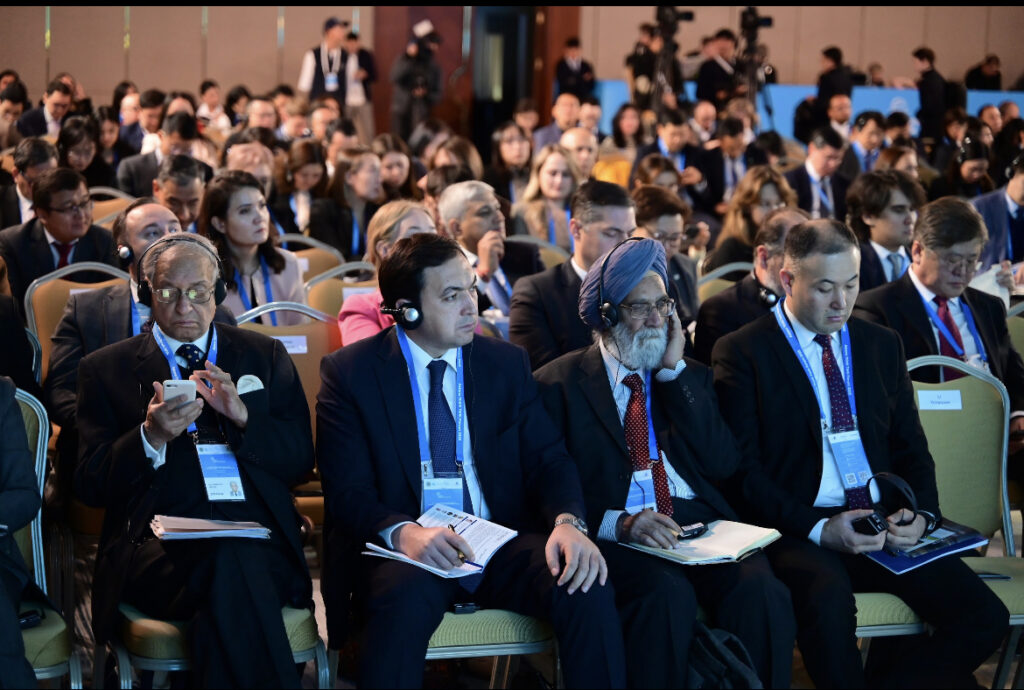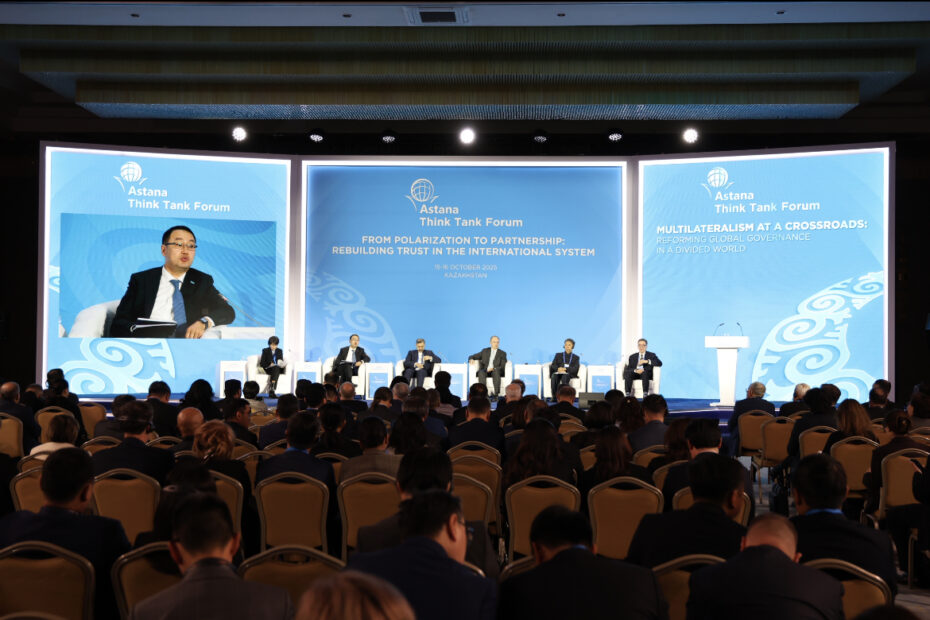On October 15, 2025, the Astana Think Tank Forum 2025 kicked off in Astana, focusing on the theme “From Polarization to Partnership: Rebuilding Trust in the International System.” The event, held under the auspices of the Astana International Forum (AIF), is organized by the Kazakhstan Institute for Strategic Studies under the President of the Republic of Kazakhstan (KazISS). Around 40 foreign experts from 20 countries, including leaders of major global think tanks, researchers, and specialists, are participating in the forum.
The first Astana Think Tank Forum took place in 2024 and was dedicated to the role of middle powers in a changing global order. Since then, the forum has established itself as an authoritative global platform for discussing pressing international issues.
The forum participants were addressed by Magzum Mirzagaliyev, Adviser to the President of the Republic of Kazakhstan, who emphasized that the forum’s agenda reflects the complexity of the current international relations system – from the reform of global governance and the end of the unipolar era to nuclear challenges, the development of artificial intelligence, and the interconnectedness of climate, water resources, and demographics.
“Kazakhstan firmly believes that trust is the cornerstone of peace and that dialogue is the most reliable path through uncertainty. Guided by the vision of President Kassym-Jomart Tokayev, our nation has consistently championed peace, trust, and responsible diplomacy”, emphasized Magzum Mirzagaliyev.
In his opening remarks, the Director of KazISS, Zhandos Shaimardanov, noted that the Astana Think Tank Forum is a platform based on trust, open discussion, and the pursuit of practical solutions.
“Our goal is to move beyond statements — to find practical solutions and shape a shared vision for the future. In this regards, think tanks play a vital role. They are bridges between knowledge and decision-making, between analysis and action. At a time when uncertainty and fragmentation are shaping global politics, the work of research institutions becomes especially important. Think tanks help societies look beyond the immediate — to understand trends, find solutions, and restore trust in dialogue,” said Shaimardanov.
The first session of the Astana Think Tank Forum 2025 was dedicated to the topic: “Multilateralism at a Crossroads: Reforming Global Governance in a Divided World.” The session was moderated by the UN Resident Coordinator in Kazakhstan, Sarangoo Radnaaragchaa. Participants discussed the current state of international institutions and focused on finding new formats for cooperation in the face of growing polarization and fragmentation of the international community.
A recurring theme in the discussion was the need to rethink the role and structure of the UN and other multilateral institutions responsible for ensuring the security, sustainability, justice, and effectiveness of the international order in the 21st century.
In this context, Kazakhstan’s First Deputy Minister of Foreign Affairs, Yerzhan Ashikbayev, emphasized the growing role of middle powers in his speech.
“Today, the formation of a “constructive consensus” and the strengthening of multilateralism become essential, as responsibility for maintaining a stable and just world order falls on a wider circle of international players. According to President of Kazakhstan Kassym-Jomart Tokayev, Middle powers are increasingly emerging as key actors in ensuring stability, peace, and development in their regions and beyond. They can act as mediators, offering dialogue and cooperative platforms where the ambitions and interests of global players collide.,” said Yerzhan Ashikbayev.
Saeed Khatibzadeh, Deputy Minister of Foreign Affairs and President of the Institute for Political and International Studies of the Ministry of Foreign Affairs of the Islamic Republic of Iran, underlined that lasting peace is only possible through strict adherence to the principles of the UN Charter, which form the basis of international law and broad consensus among states.
Another session participant, Joshua Lincoln, Senior Research Fellow at the Center for International Law and Governance at Fletcher School of Law and Diplomacy, Tufts University, and a Visiting Fellow at Kellogg College, University of Oxford, pointed out that the current system of multilateral institutions and its foundational document, the UN Charter, were created in a fundamentally different historical context when factors such as the Internet, artificial intelligence, gender and climate agendas were absent.
“Given this complex new historical context and a more complicated reality, the role of middle powers will only grow. This is largely because middle powers are expanding their agency through constructive interaction and arbitration between great and small powers,” emphasized Joshua Lincoln.
Li Yongquan, Head of the Scientific Council of the Institute for the Social Development of Europe and Asia at the Development Research Center of the State Council of China, shared his opinion that the ongoing transition from a unipolar world to a multipolar one is a painful process full of uncertainty and confrontation.
“Nevertheless, cooperation must become the most significant feature of a multipolar world. Cooperation requires adherence to the basic principles of international law, primarily the UN Charter, and it demands that major powers take responsibility for maintaining peace. We already have good examples of such cooperation in the Shanghai Cooperation Organization and the Central Asia + China mechanism,” said Li Yongquan.
Charles McLean, Founder and Managing Director of Borderless Consulting Group, emphasized in his speech that it is middle powers that are best positioned to propose a constructive agenda and effective reform of the international multilateral system.
“Despite the focus on great powers and the recurring confrontations between them, it is the middle powers that are increasingly capable of promoting their agendas, acting as agents, and balancing the international system. The rise of Kazakhstan as a middle power, President Kassym-Jomart Tokayev’s address at the UN General Assembly anniversary — all of this shows that the group of middle powers has a very clear vision of how to reform the system of multilateral institutions with a practical orientation in light of the major changes happening in the world,” concluded Charles McLean.
The Astana Think Tank Forum 2025 continues its work on October 15-16. During this period, nine sessions will address key international agenda issues, such as the prospects of multilateral cooperation in the context of competition among major powers, the transformation of the security architecture, the future of nuclear disarmament and nonproliferation, and the impact of Afghanistan on the Central Asian region.
Other topics on the forum’s agenda include investments in the era of fragmented global markets, the development of trade and transport corridors in Eurasia, artificial intelligence and related ethical dilemmas, and the impact of climate change and water issues on demographic processes and migration.
The Astana Think Tank Forum aims to promote open and constructive dialogue between researchers, experts, representatives of international organizations, governments, and business circles. It is designed to develop recommendations for inclusive and long-term formats of interaction that contribute to global stability and trust, and to strengthen Kazakhstan’s position as a responsible and active “middle power” contributing to the development of partnerships in international relations.











